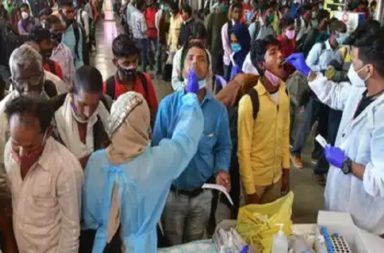Hazmat-suited workers poke plastic swabs down millions of throats in China each day, leaving bins bursting with medical waste that has become the environmental and economic levy of a zero-Covid strategy.
China is the last major economy wedded to stamping out infections no matter the cost.
Near-daily testing is the most commonly used weapon in an anti-virus arsenal that includes snap lockdowns and forced quarantines when just a few cases are detected.
From Beijing to Shanghai, Shenzhen to Tianjin, cities are now home to an archipelago of temporary testing kiosks, while authorities order hundreds of millions of people to get swabbed every two or three days.
Mass testing appears set to stay as Chinese authorities insist zero-Covid has allowed the world’s most populous nation to avoid a public health catastrophe.
But experts say the approach — a source of political legitimacy for the ruling Communist Party — creates a sea of hazardous waste and a mounting economic burden for local governments who must plough tens of billions of dollars into funding the system.
Beijing had previously boasted of its success in crushing Covid-19, allowing the economy to rebound and normal life to return while swathes of the globe struggled to douse a pandemic that has killed more than four million people worldwide.
But the latest outbreak is threatening that record with nearly 500 domestic cases reported since mid-July, when a cluster among airport cleaners in Nanjing, Jiangsu province, was found.
Wuhan, where the virus first emerged in 2019, reported its first local infections in over a year this week and said Tuesday it was “swiftly launching” testing of all 11 million residents.
Long lines of residents waited at outdoor testing stations in the summer heat Tuesday, fanning themselves with paper forms while workers in hazmat suits took throat samples.
Meanwhile, Nanjing has tested its 9.2 million residents three times after shutting down gyms and cinemas and closing off residential compounds.





